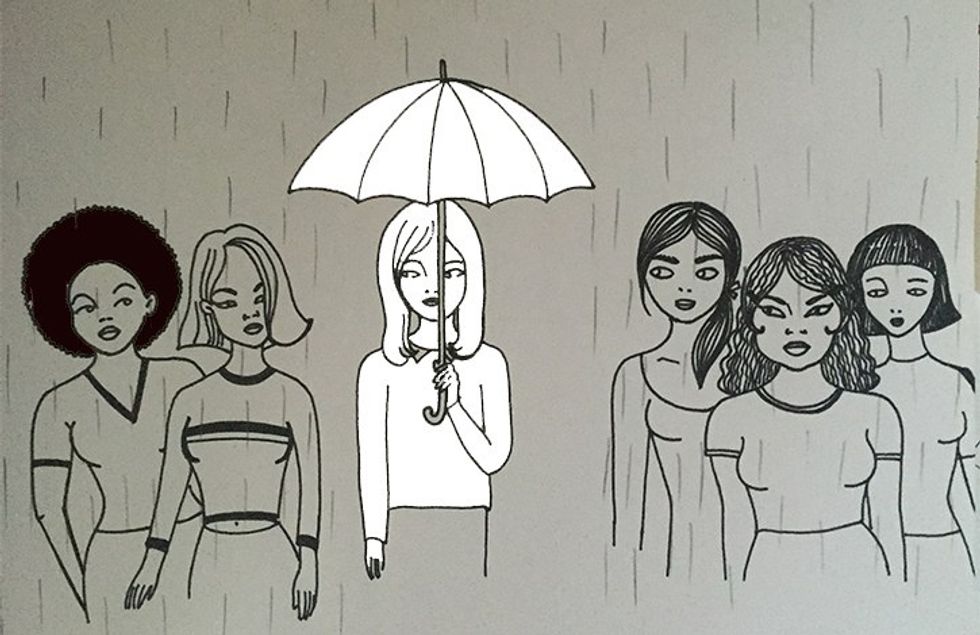Lena Dunham sparked outrage yet again this past week over comments she made on her podcast "Women of the Hour". She was discussing reproductive rights wen abortion, naturally, came up as a topic of interest. She described her time at a Planned Parenthood in Texas, where she was asked to share her abortion story. It was then that Dunham realized she had never had an abortion and felt entitled when saying she hadn't. She realized that she hadn't empathized with people who had and therefore contributed to the stigma surrounding abortions.
"Now I can say that I still haven't had an abortion, but I wish I had," Dunham said as she concluded her story. The statement drew heavy ire.
Now, Dunham identifies as a feminist. She genuinely wants to help women and minorities with her platform. There's just one problem--Dunham is a white feminist.
According to an article by Leia Smoudianis for The Feminist Project, "when some white women think about gender equality, they think about equality for their own race. They do not consider non-white, transgender, or gay women, or women with disabilities. Whether it’s done consciously or unconsciously, this is white feminism....[it's] not feminism. In other words, the advocacy of rights for some women, but not others is not feminism". White feminism is often seen as synonymous to mainstream feminism, though the two can differ (especially as diversity in media increases, if we're considering all forms of it).
We've all seen white feminists, and some are worse than others. Jennifer Lawrence, Amy Schumer, and Lena Dunham are three of the most ignorant white feminists in the limelight. But the point's been made and remade and made again. Yes, they're white feminists. Yes, this means that they don't advocate for the very people who need feminism the most. But what many fail to reveal is the real world repercussions of this ignorant--and dangerous--offshoot of so-called feminism.
The movement may have sprung from women's rights, but feminism serves to stand all who are oppressed. Intersectional feminism became popularized after feminist Gloria Steinem shared its importance. Intersectionality refers to the "interconnected nature of social categorizations such as race, class and gender as they apply to a given individual or group, regarded as creating overlapping and interdependent systems of discrimination or disadvantage". The term was coined by civil rights advocate and scholar Kimberlé Williams Crenshaw. Only when intersectional feminism is practiced are rights going to be fought for and people helped.
White feminists like Dunham fail to comprehend the importance of intersectionality. They view oppression as a one-dimensional phenomena. This faulty view of oppression is the foundation of their faulty beliefs. They claim that their struggles as white, cis, able-bodied, straight women enable them to speak for every woman and everyone in the fight for equality. Because their cisgender womanhood allows them to speak for all people, at least according to their logic. This is why women like Dunham often have foot-in-the-mouth moments--they speak without thinking.
Words hold power. But many white feminists think it's empowering and quirky to say whatever is on their mind. American culture is heavily dominated by celebrities--if Dunham or another white feminist in the spotlight say something offensive as a joke, thousands (if not millions) are going to hear about it. And many will internalize her words as acceptable. Misconceptions are what pave the way for prejudice, and prejudice paves the way for oppression to take place.
But famous white feminists know their status. They know that their every move is being watched. So why aren't they using that status to elevate the voices of those who are really oppressed, such as people of color? Disabled people? People who are part of the LGBTQ+ community? And countless others? Again, it's because they cannot comprehend the sheer complexity of the connection between identity and oppression.
Women who have declared (or whispered) themselves to be Trump supporters constitute one of the more recent examples. Many called themselves feminists as they cast a vote for a man who degrades everyone around him, especially women and minorities. 53% of white women voted for Trump despite these red flags. And, for the most part, women who voted for Trump were not minorities.
(Photo credit: MTV)
The electoral college already causes the white vote to be magnified, so the vote is likely to swing in whichever direction white voters decide to. White women helped decide Trump's victory, a political debacle that will hold terrible consequences for other women and minorities in the years to come.
According to an article by Etienne Rodriguez for Affinity Magazine, white feminism did indeed help Trump win. White feminists "focused on the issues of being a white woman and disregarded all the hate and oppression that white women inflict on others" during the election cycle. While it is not white feminism alone that caused Trump, the correlation is undeniable. White women in power had the opportunity to call out the real issues with Trump, but many chose to mock or point out his lack of intelligence and experience. But their peers needed to become aware of their internalized bigotry, and realize that Trump perpetuated it through fearmongering and lies. White women could've prevented Trump and they didn't.
Trump's election is only one example of the consequences of white feminism, but it's an increasingly relevant one. The off-handed, "quirky", and often offensive nature of white feminism increases the capacity for bigotry in a culture already so plagued by it. Unless white feminists recognize their privilege and the danger they pose with their supposed feminism, they will continue to empower the very setbacks they should be fighting against. And everyone else will pay the worst of consequences for it.



























